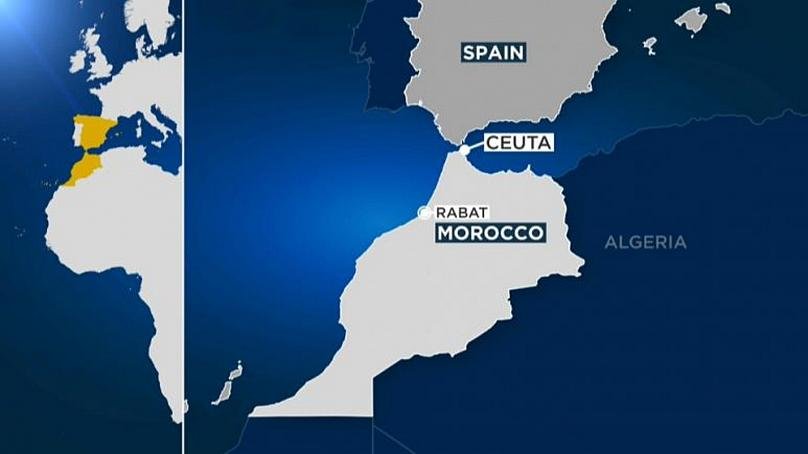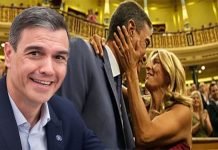
Around 6,000 migrants from Morocco arrived in the Spanish enclave of Ceuta between Monday and Tuesday amid a tense diplomatic s
Overwhelmed soldiers separated the adults from the young and carried children in their arms while Red Cross workers helped an endless trickle of migrants who were emerging from the water shivering and exhausted. One unconscious woman laid on the sand before she was carried away on a stretcher.
The sudden influx of migrants has fueled the diplomatic spat between Rabat and Madrid over the disputed Western Sahara region and created a humanitarian crisis for Ceuta, the Spanish city of 85,000 in North Africa on the Mediterranean Sea, separated from Morocco by a double-wide, 10-meter (32-feet) fence.
Video cameras captured how some people rushed up the hills surrounding the city and jumped over the double fence.
Spanish Prime Minister Pedro Sánchez cancelled a trip to Paris, where he was to attend a summit on international aid to Africa, and announced an imminent visit to the southern city. While calling Morocco a “friend of Spain,” Sánchez also urged authorities to “respect the shared border.”
By Tuesday morning, at least 6,000 sea-soaked people had crossed the border into Ceuta since early Monday, the Spanish government said, including 1,500 thought to be teenagers. The number getting in slowed but didn’t stop Tuesday even as Spain deployed additional police and soldiers to the border.
Some 2,700 adults were already returned to Morocco, according to Spain’s Interior Ministry. Morocco and Spain signed an agreement three decades ago to expel all those who swim across the border.
Yet many arriving Tuesday were sub-Saharan Africans who are usually fleeing poverty or violence back home. Spain has agreements to return some of those migrants to their native countries but not all.
By Tuesday afternoon, Moroccan authorities closed the road leading to the border post with Ceuta and anti-riot police dispersed crowds of would-be migrants. Neither the government in Rabat nor local officials have commented about the mass influx or responded to queries by The Associated Press.
“It’s such a strong invasion that we are not able to calculate the number of people that have entered,” said Juan Jesús Vivas, the president of Ceuta, an autonomous city of about 20 square kilometres (7.7 square miles).
Boats crammed with men, women, and children made the crossing into Spanish territory while many others swam or even paddled across the border.
At least 1,500 of those that have crossed into Ceuta, a city of 85,000 that is separated from Morocco by a 10-metre fence, are believed to be teenagers.
EU land borders with Africa
Last month, around 100 migrants swam to Ceuta in groups of 20 to 30. Most were deported back to Morocco.
The Spanish enclaves of Ceuta and Melilla have the European Union’s only land borders with Africa, making them popular entry points for migrants seeking a better life in Europe.
When Morocco gained independence in the 1950s Spain held onto control of the two cities.
Eighty-six migrants from sub-Saharan Africa managed to enter Melilla, 400 kilometres to the east of Ceuta, on Tuesday.
But that was out of a total of “more than 300” who attempted to cross, according to authorities.
Ceuta is a Spanish autonomous city on the north coast of Africa. Bordered by Morocco, it lies along the boundary between the Mediterranean Sea and the Atlantic Ocean. It is one of nine populated Spanish territories in Africa and, along with Melilla, one of two populated Spanish territories on mainland Africa.

The spike in arrivals took place after Rabat expressed its anger last month when Spain discreetly admitted Brahim Ghali, the leader of Western Sahara’s rebel Polisario Front to a Spanish hospital.
Morocco’s Foreign Ministry had issued a strongly worded statement criticising what it said was Spain’s decision to admit Ghali under a false identity without informing Morocco, warning of repercussions for relations between the countries.
Authorities say that the crossings began at 2 am on Monday in the border area of Ceuta known as Benzú and were then followed by a few dozen people near the eastern beach of Tarajal.
The wave of arrivals came at a point of tension between Madrid and Rabat over the presence in Spain of the leader of the Western Sahara independence movement.
Rabat reacted angrily after it emerged that the leader of the Polisario Front, Brahim Ghali, has been treated at a hospital in Spain for COVID-19 since mid-April.
The Polisario Front has long fought for the independence of Western Sahara from Morocco.

Asked by reporters whether Morocco was relaxing controls on departing migrants, Spain’s foreign minister simply said she had no information.
Blanca Garcés, a senior researcher at the Barcelona Centre for International Affairs, says one of the questions raised by the arrival of the migrants is where were the Moroccan police?
Video appears to show Moroccan border guards open the gates to let “refugees” cross into the Spanish territory of #Ceuta. People are being used as leverage. Morroco is angered at Spain treating Brahim Ghali the leader of the Polisario Front, Western Sahara independence movement. pic.twitter.com/qF5RvWmpHA
— Paul Knaggs (@PaulKnaggs) May 18, 2021
“There are many witnesses who explained that the police were not there anymore, trying to stop them. And this, of course, has to do with the tension between the Moroccan government and the Spanish government,” she explains. “It’s using the migration card is used as blackmail, as a way to put pressure upon the member states. In this case, the Spanish government.”
The daylight didn’t stop the crossings, as entire families with children, swam or boarded inflatable boats, said the spokesman. The influx continued on Tuesday, although in lower numbers.
The migrants were checked by Red Cross medics before being taken to a reception centre, where they were detained, a police spokesman said on Monday.
Last month, around 100 migrants swam to Ceuta in groups of 20 to 30. Most were deported back to Morocco.
Migrants try to reach the enclaves either by swimming along the coast or climbing the tall border fences that separate them from Morocco.
Support Independent Journalism Today
Our unwavering dedication is to provide you with unbiased news, diverse perspectives, and insightful opinions. We're on a mission to ensure that those in positions of power are held accountable for their actions, but we can't do it alone. Labour Heartlands is primarily funded by me, Paul Knaggs, and by the generous contributions of readers like you. Your donations keep us going and help us uphold the principles of independent journalism. Join us in our quest for truth, transparency, and accountability – donate today and be a part of our mission!
Like everyone else, we're facing challenges, and we need your help to stay online and continue providing crucial journalism. Every contribution, no matter how small, goes a long way in helping us thrive. By becoming one of our donors, you become a vital part of our mission to uncover the truth and uphold the values of democracy.
While we maintain our independence from political affiliations, we stand united against corruption, injustice, and the erosion of free speech, truth, and democracy. We believe in the power of accurate information in a democracy, and we consider facts non-negotiable.
Your support, no matter the amount, can make a significant impact. Together, we can make a difference and continue our journey toward a more informed and just society.
Thank you for supporting Labour Heartlands









